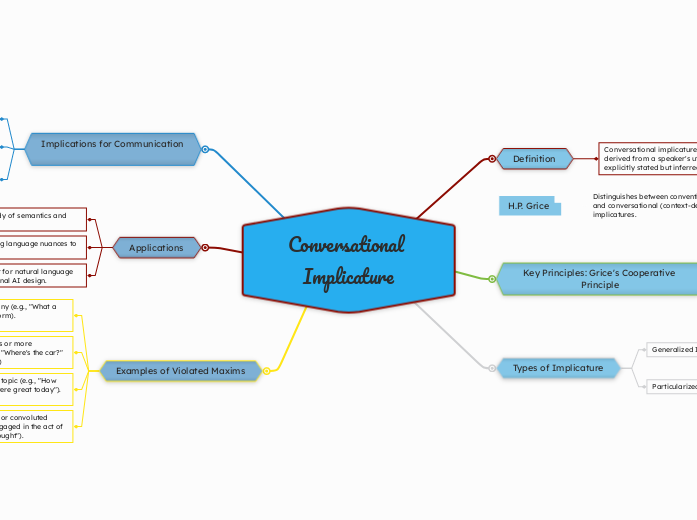Conversational Implicature
Definition
Conversational implicature refers to the meaning derived from a speaker's utterance that is not explicitly stated but inferred based on context.
H.P. Grice
Distinguishes between conventional (immutable) and conversational (context-dependent) implicatures.
Key Principles: Grice's Cooperative Principle
Maxim of Quality
Be truthful. Do not provide information that is false or unsupported by evidence.
Maxim of Quantity
Provide the right amount of information—neither too much nor too little.
Maxim of Relation
Be relevant.
Maxim of Manner
Be clear, avoid ambiguity, and be orderly.
Types of Implicature
Generalized Implicature
Does not depend on specific context (e.g., "Some people passed the test" implies not everyone passed).
Particularized Implicature
Requires specific context to infer meaning (e.g., "Can you pass the salt?" implies a request rather than a question about ability).
Implications for Communication
Conversational implicature relies on shared knowledge and context.
Helps achieve subtlety, humor, or politeness in communication.
Understanding implicature is crucial for interpreting indirect or implied meanings in interactions.
Applications
Linguistics: Enhances the study of semantics and pragmatics.
Teaching: Useful for teaching language nuances to learners.
AI Development: Important for natural language processing and conversational AI design.
Examples of Violated Maxims
Flouting Quality: Sarcasm or irony (e.g., "What a beautiful day!" said during a storm).
Flouting Quantity: Providing less or more information than required (e.g., "Where's the car?" Answer: "In front of a building")
Flouting Relation: Changing the topic (e.g., "How was work?" Answer: "The kids were great today").
Flouting Manner: Using obscure or convoluted expressions (e.g., "The entity engaged in the act of purchasing" instead of "They bought").
